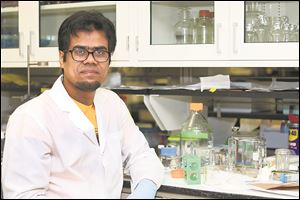
UT researchers harnessing the immune system with cancer vaccine
5/6/2018Our immune system works day and night to protect our body against harmful organisms that threaten our health, such as viruses or bacteria. These invasive organisms have foreign proteins, called antigens, on their surface.
Our immune system can be compared to a complicated game of dominoes that uses many different weapons to attack these foreign antigen targets. Each step triggers another step of the immune response until the targeted cell is killed.

Md Kamal Hossain is a student in the College of Pharmacy and Pharmaceutical Sciences at the University of Toledo.
One example is the production of antibodies that recognize and bind to foreign proteins. This then activates other steps that eventually kill the cell that the foreign antigen is on.
But what if the threat arises from what were once normal cells in our body? Can the immune system detect cancer cells? The answer is often no, unfortunately. Most of the time cancer cells hide from the immune system by either concealing or simply not having foreign proteins on their surface that trigger the immune system
However, researchers have now discovered how to train our immune system to recognize cancer cells. This approach is called immunotherapy and is still evolving. Researchers from all over the world are working on different cancer immunotherapy approaches, such as very targeted antibody therapy (monoclonal) to specific antigens, or antibodies that act as inhibitors of cell division to stop cancer cells from growing, and even cancer vaccines such as the Hepatitis B vaccine to prevent chronic Hepatitis B infection and subsequent liver cancer. Each immunotherapy approach has a different way of working. However, all immunotherapy approaches work to harness our immune system.
At the University of Toledo College of Pharmacy and Pharmaceutical Sciences, I am working in the laboratory of Dr. Katherine Wall in the Department of Medicinal and Biological Chemistry.
We study different ways of enhancing the immune system by using cancer vaccines. Vaccines, as you know, act to prevent disease within our bodies instead of attacking the disease after it arrives.
How do we harness the immune system to make a cancer vaccine? One type of immune cell, called a dendritic cell, can capture specific human antigens on cancer cells. Dendritic cells then display the cancer cell antigen to helper cells that protect our bodies from foreign invaders in two different ways.
First, these helper cells help another important immune cell to make antibodies that bind to the specific antigen on cancer cells. These targeted cancer cells are then recognized and dispatched by specific hunter immune cells.
Second, these helper cells activate another type of killer immune cell that kills cancer cells directly.
We are working on different ways to aid the dendritic cells to display cancer cell antigens so that the immune system will activate multiple weapons to fight against cancer cells.
One exciting way to help target cancer cell antigens is by starting with natural antibodies already present in our bodies. The use of natural antibodies helps to reduce side effects caused by external antibodies often used for vaccines.
We use an antibody called anti-rhamnose antibody. We gave a mouse model this antibody and the antigen it binds to (rhamnose), coupled with a cancer-specific antigen. This approach activated the production of both cancer-specific antibodies and cancer killing cells. Both steps are very important for an effective immune response that will fight cancer successfully.
We are also encouraging dendritic cells to help by using just part of an antibody instead of the whole antibody. This antibody part is teamed with a cancer-specific antigen and given to the mouse model. This approach helps dendritic cells to display the cancer-specific antigen more effectively to the immune system, which in turn, helps to make more cancer-specific antibodies and cancer killing cells.
The major advantages of the above vaccination approaches are that they are not limited to specific cancers but can be used in preventing many different cancers from growing into clinical disease.
We are now investigating whether this approach would be as helpful in humans as it is in the mouse model. We are currently using a humanized mouse model that will tell us how the human body should respond to our cancer vaccines. So far, the results are promising.
Md Kamal Hossain is a student earning his PhD at the University of Toledo College of Pharmacy and Pharmaceutical Sciences. Mr. Kamal is doing his research in the laboratory of Dr. Katherine Wall in the Department of Medicinal & Biological Chemistry. This project is a collaborative effort with Dr. Steven Sucheck from the Department of Chemistry and Biochemistry. For more information, contact MdKamal.Hossain@rockets.utoledo.edu or go to utoledo.edu/pharmacy/depts/mbc/.